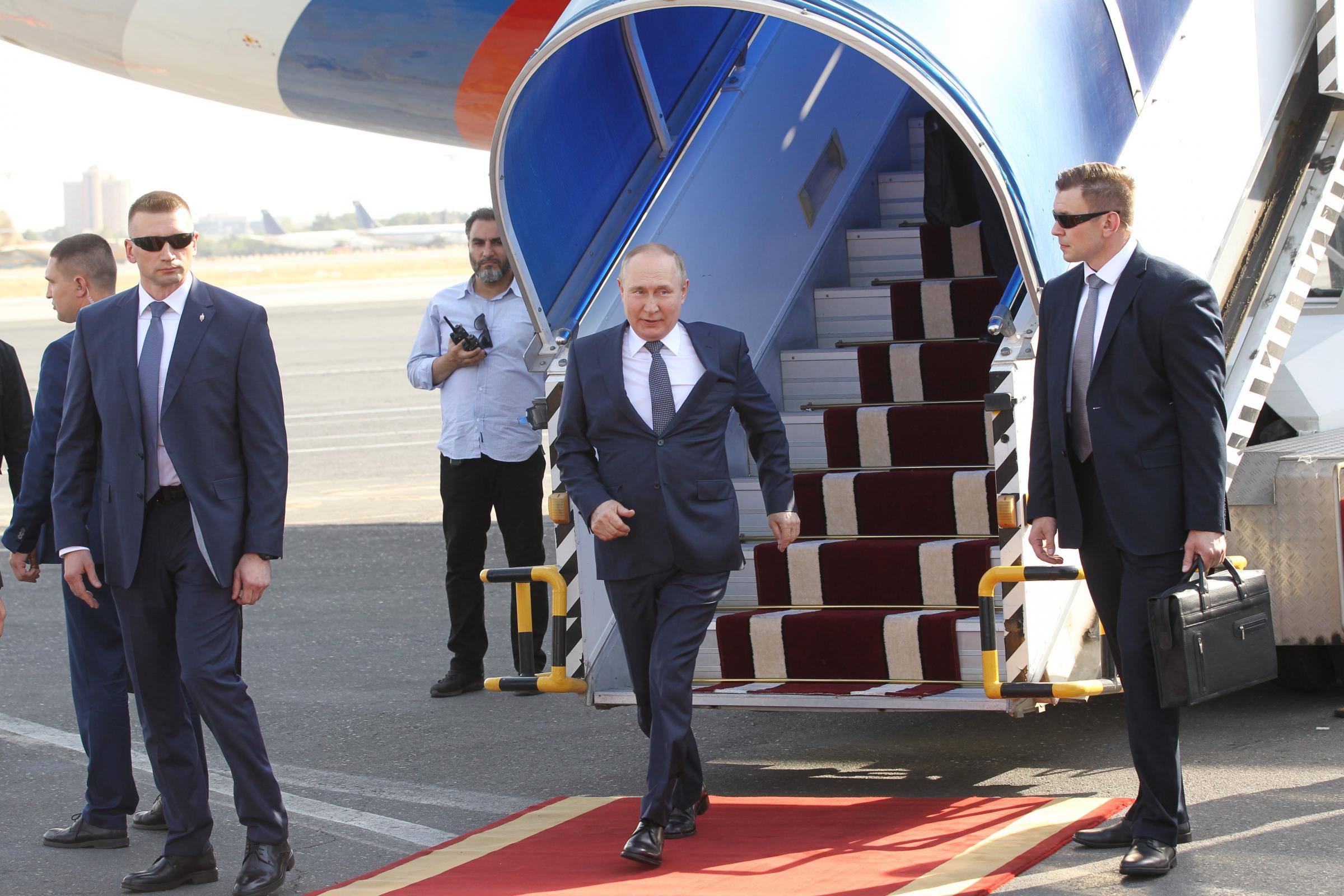
RUSSIAN President Vladimir Putin arrived in Iran yesterday for a visit intended to deepen ties with regional heavyweights as part of Moscow’s challenge to the United States and Europe amid its war in Ukraine.
In only his second trip abroad since Russian tanks rolled into Ukraine in February, Putin scheduled talks with Iran’s president Ebrahim Raisi and Turkish president Recep Tayyip Erdogan about the pressing issues facing the region, including the conflict in Syria and a UN-backed proposal to resume exports of Ukrainian grain to ease the global food crisis.
Putin is seeking to bolster ties with Tehran, a fellow target of US sanctions and a potential military and trade partner.
In recent weeks, Russian officials visited an airfield in central Iran at least twice to review Tehran’s weapons-capable drones for possible use in Ukraine, the White House has alleged.
The Tehran trip offers Putin a chance for a high-stakes meeting with Erdogan, who has sought to help broker talks on a peaceful settlement of the Russia-Ukraine conflict, as well as help negotiations to unblock Ukrainian grain through the Black Sea.
Nato member Turkey has not imposed sanctions on the Kremlin, making it a sorely needed partner for Moscow. Grappling with runaway inflation and a rapidly depreciating currency, Turkey also relies on the Russian market.
It comes just days after US president Joe Biden visited Israel and Saudi Arabia – Tehran’s primary rivals.
From Jerusalem and Jeddah, Biden urged Israel and Arab countries to push back on Russian, Chinese and Iranian influence that has expanded with the perception of America’s retreat from the region.
“Iran is (the) centre of dynamic diplomacy,” Iranian Foreign Minister Hossein Amir-Abdollahian wrote on Twitter, adding the meetings will “develop economic co-operation, focus on security of the region ... and ensure food security.”
Fada-Hossein Maleki, a member of the Iranian parliament’s influential committee on national security and foreign policy, described Russia as Iran’s “most strategic partner”.
His comments belied decades of animosity stemming from Russia’s occupation of Iran during World War Two – and its refusal to leave afterward.
The focus of talks among Putin, Iran’s supreme leader Ayatollah Ali Khamenei and president Raisi will be the decade-old conflict in Syria, where Iran and Russia have backed president Bashar Assad’s government, while Turkey has supported armed opposition factions.
Russia intervened in the conflict in 2015, pooling efforts with Iranian forces and using its air power to shore up Assad’s fledgling military.
Putin’s foreign policy adviser Yuri Ushakov said the parties will discuss efforts to encourage a political settlement, while Erdogan is expected to take up Turkey’s threats of a new military offensive in northern Syria to drive away US-backed Syrian Kurdish fighters from its borders.
The operation is part of Turkey’s plan to create a safe zone along its border with Syria that would encourage the voluntary return of Syrian refugees.
Talks to lift a Russian blockade and get Ukraine’s grain into global markets will also be on the agenda.
Last week UN, Russian, Ukrainian and Turkish officials reached a tentative agreement on some aspects of a deal to ensure the export of 22 million tons of desperately needed grain and other agricultural products trapped in Ukraine’s Black Sea ports by the fighting.
Yesterday’s meeting between Putin and Erdogan could help clear the remaining hurdles, a major step toward alleviating a food crisis that has sent prices of vital commodities like wheat and barley soaring.
It came after Ukrainian President Volodymyr Zelenskyy expanded the shakeup of his security services by suspending 28 more officials, a day after he dismissed two senior officials over allegations that their agencies harboured “collaborators and traitors”.
Zelenskyy said a “personnel audit” of the Security Service of Ukraine (SBU) was under way.
“Different levels, different areas of focus. But the reasons are similar – unsatisfactory results of work,” Zelenskyy said.
On Sunday, he had fired SBU chief Ivan Bakanov and prosecutor general Iryna Venediktova.
“Six months into the war, we continue to uncover loads of these people in each of these agencies,” said Andriy Smirnov, deputy head of Ukraine’s presidential office.
Analysts said the moves are designed to strengthen Zelenskyy’s control over the army and security agencies, which have been led by people appointed before the Russian invasion began on February 24.
Meanwhile, Russia pressed forward with its missile and shelling attacks, which Ukrainian officials said were designed to intimidate the civilian population and create panic.
Russian cruise missiles struck villages around southern Ukraine’s port city of Odesa early yesterday, hitting houses, a school and a community centre.







